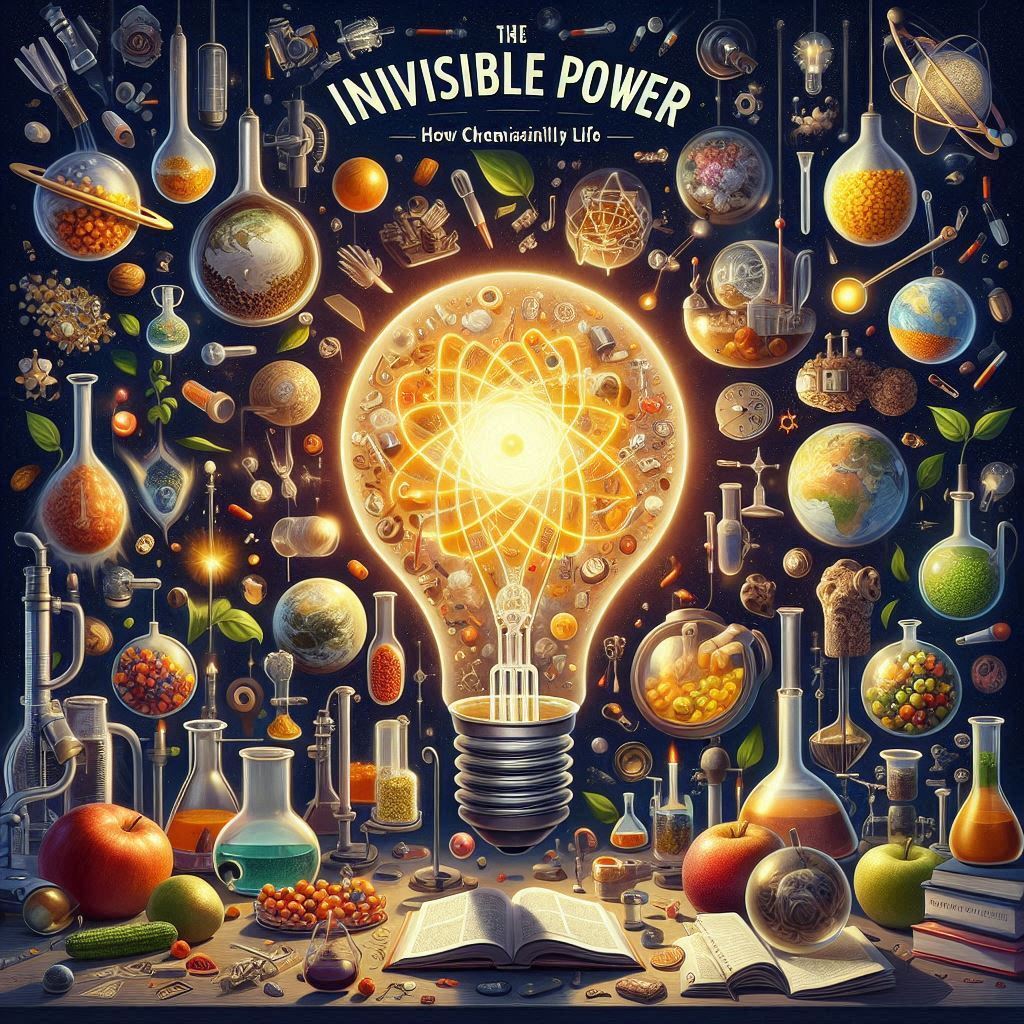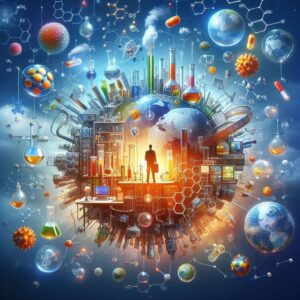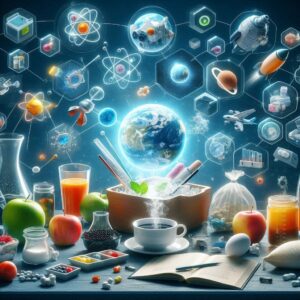
The Invisible Power: How Chemistry in Our Daily Life Shapes the Modern World
Chemistry in Our Daily Life existence is greater than just a department of science limited to laboratories and academic textbooks. It is the invisible pressure influencing the whole thing from the food we devour to the products we use, the air we breathe, and even the feelings we experience. This effective and ever-gift subject plays a pivotal function in making our lives more secure, healthier, and more handy.
In this complete manual, we’ll delve into the diverse ways chemistry touches our each day lives, provide realistic insights for leveraging chemical understanding, and equip readers with actionable tips for making higher, science-knowledgeable choices.

Table of Contents
- Understanding Chemistry in Our Daily Life
- Household Chemistry: Behind the Scenes
- Chemistry in Food and Nutrition
- Daily Self Care Practices
- Chemistry in Health and Medicine
- Environmental Chemistry: Staying Sustainable
- Innovative Applications in Modern Living
- Expert Quotes on Chemistry in Our Daily Life
- Table: Common Applications of Chemistry in Daily Life
- Final Thoughts and Actionable Advice
- FAQs
Understanding Chemistry in Our Daily Life
Chemistry is the science of depend and its interactions. Whether it’s the combustion of fuel to your vehicle engine, the detergents cleaning your clothes, or the preservatives in your pantry, chemistry is continuously at paintings.
Importance:
- Provides expertise of ways products are made.
- Encourages innovation in sustainable dwelling.
“Chemistry isn’t just a subject, it’s a way of seeing the sector extra without a doubt.” — Dr. Linda Hofstadter, Materials Chemist
Household Chemistry: Behind the Scenes
Our houses are packed with chemical interactions that frequently pass overlooked. From cleaning agents to air fresheners, every product is the result of a cautiously formulated chemical process.
Common Examples:
- Cleaning Products: Surfactants in soaps wreck down grease.
- Baking Soda & Vinegar: Acid-base reactions are used for cleaning purposes.
- Bleach: Sodium hypochlorite is usually used for disinfection purpose.
Tips:
- Switch to biodegradable cleaners helps to reduce chemical waste.
- Store reactive agents separately (e.g., bleach and ammonia).
- Opt for herbal fragrances to avoid synthetic allergens.

Chemistry in Food and Nutrition
Chemistry plays a relevant role in the food we consume. From flavor development to protection and protection, it is an essential thing of our dietary selections.
Key Areas:
- Preservatives: Chemicals like benzoates expand shelf existence.
- Emulsifiers: Help blend oil and water in merchandise like mayonnaise.
- Flavor Enhancers: MSG (monosodium glutamate) will growth savory taste.
Actionable Strategies:
- Read food labels for chemical additives.
- Use antioxidants like lemon or vinegar to preserve food clearly.
- Learn about dietary chemistry to make healthier choices.
Daily Self Care Practices
From the toothpaste we use to skincare merchandise and cosmetics, chemistry facilitates ensure safety, efficacy, and person pleasure.
Examples:
- Toothpaste: Contains fluoride to shield teeth.
- Shampoos: Use surfactants and pH balancers.
- Deodorants: Aluminum compounds block sweat glands.
Best Practices:
- Choose products with fewer synthetic components.
- Be aware about allergens like parabens or sulfates.
- Opt for pH-balanced formulas to fit skin chemistry.
“Modern skin care is a really perfect combination of chemistry and biology, tailored to character wishes.” — Dr. Nina Raman, Cosmetic Chemist

Chemistry in Health and Medicine
Pharmaceuticals and clinical innovations are direct effects of superior chemical studies. Chemistry permits the advent of existence-saving pills and diagnostic tools.
Applications:
- Antibiotics: Chemical compounds that focus on micro organism.
- Vaccines: Use chemically stabilized proteins or mRNA.
- Diagnostic Kits: Involve reagent chemistry for accuracy.
Tips:
- Store medicines at recommended temperatures.
- Follow dosage instructions carefully to avoid chemical imbalance.
- Stay up to date with medical chemistry improvements like CRISPR.
Environmental Chemistry: Staying Sustainable
As we end up more eco-aware, information environmental chemistry enables us make picks that reduce pollution and aid depletion.
Focus Areas:
- Recycling Processes: Chemistry separates materials for reuse.
- Green Chemistry: Develops safer chemical formulations.
- Water Purification: Uses activated carbon and chlorine.
Strategies:
- Choose eco-labeled merchandise.
- Participate in network recycling applications.
- Support brands using sustainable chemical practices.
Innovative Applications in Modern Living
Beyond traditional uses, chemistry is now key in tech innovations, energy solutions, and futuristic materials.
Trends:
- Battery Technology: Lithium-ion chemistry in electronics.
- Smart Fabrics: Respond to temperature and moisture.
- Bioplastics: Chemically derived from renewable sources.
How to Leverage:
- Stay informed about consumer tech chemistry.
- Advocate for chemical transparency in new products.
- Support innovation through STEM education.
Expert Quotes on Chemistry in Our Daily Life
“Chemistry in every day life is not just about reactions; it is about results that enhance first-rate of life.” — Dr. Emily Zhang, Organic Chemist
“Every motion we take—from cooking to commuting—has a chemical footprint. Awareness is key to sustainability.” — Prof. Michael J. Tannen, Environmental Scientist
Table: Common Applications of Chemistry in Daily Life
| Application Area | Common Chemicals/Compounds | Purpose | Safety Tip |
|---|---|---|---|
| Cooking | Sodium bicarbonate, Vinegar | Baking, Cleaning | Avoid mixing acids and bases |
| Skincare | Salicylic Acid, Retinol | Acne Treatment, Anti-aging | Patch test before full use |
| Cleaning Products | Ammonia, Bleach, Surfactants | Disinfection, Degreasing | Do not mix ammonia and bleach |
| Medicines | Paracetamol, Ibuprofen | Pain relief, Anti-inflammation | Store in a groovy, dry place |
| Agriculture | Urea, Pesticides | Fertilization, Pest Control | Use protective gear |
| Water Treatment | Chlorine, Activated Carbon | Disinfection, Purification | Avoid over-chlorination |
Final Thoughts and Actionable Advice
Chemistry in Our Daily Life is an empowering problem that gives insights and sensible advantages at some stage in each facet of present day residing. Understanding chemical standards allows humans make higher selections—whether it’s deciding on the proper food, maintaining non-public hygiene, or choosing sustainable products.
Key Takeaways:
- Stay informed about ingredients in products.
- Make eco-conscious choices grounded in chemical knowledge.
- Use chemistry to troubleshoot ordinary troubles effectively.
With a deeper appreciation of ways chemistry impacts our daily lives, we are able to higher navigate the contemporary world with intelligence, safety, and sustainability in mind.
It refers back to the chemical strategies and compounds that impact everyday sports like cooking, cleansing, and fitness care.
FAQs
What is chemistry in our daily life?
It refers back to the chemical tactics and compounds that effect everyday activities like cooking, cleaning, and health care.
How does chemistry have an effect on the food we eat?
Chemistry determines the maintenance, flavor, nutritional content fabric, and safety of meals.
Are cleaning agents safe?
When used correctly and stored properly, most are safe. Always read labels and avoid mixing chemicals.
How can I lessen dangerous chemical publicity?
Use natural products, take a look at labels for acknowledged irritants, and follow protection instructions.
What are examples of chemistry at home?
Boiling water (physical change), using vinegar to clean (acid-base reaction), and baking with yeast (fermentation).
